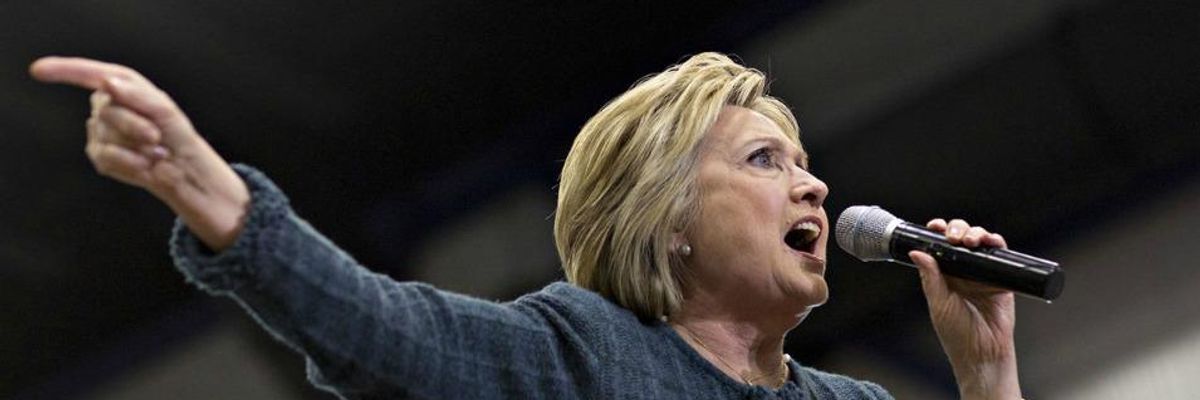Hillary Clinton is under fire for defending the millions of dollars she has collected from Wall Street and other monied interests, as critics charge that her rationalization of those contributions ignores the dangers of a pay-for-play political system and amounts to an acceptance--if not a "tacit embrace"--of the role of money in politics.
Since last week's Democratic debate, Clinton has repeatedly accused rival Sen. Bernie Sanders of attempting to 'smear' her with insinuations that she's been bought through political donations, speaking fees, and other payments.
"What the Sanders campaign is trying to do is link donations to my political campaign or really donations to anyone's political campaign, with undue influence with changing people's views and votes," the former secretary of state told CBS' Face the Nation on Sunday, repeating statements made during Thursday's debate. "I've never ever done that and I really do resent the implication or as I said the other night the insinuation."
Kurt Walters, a campaign manager with the anti-corruption group Rootstrikers, toldHuffington Post's Zach Carter that he understands how this "might be an appealing defense," given how this charge has resonated with voters and considering Sanders' recent gains on the frontrunner.
"But just like the Citizens Unitedline of thinking," Walters adds, "it ignores all of the other ways that money influences politics beyond the explicit exchange of cash for a vote."
"Clinton, like our Supreme Court, ignores thousands of years of human experience in how money corrupts politics not just through quid pro quos, but also by shaping attitudes," agreed Pulitzer Prize-winning economics writer David Cay Johnston.
Carter reports:
Like Clinton, the [sic]Citizens United relies on a narrow definition of corruption as straightforward bribery--a literal trade of money for votes. Previous Supreme Court decisions, like McConnell v. Federal Election Commission, had applied a broader standard than Citizens United--one in which money can exercise an "undue influence" over policymaking, even absent explicit quid pro quo deals.
And while Democrats have long acknowledged that a check from a big donor might not result in a politician switching her position on an issue, they have argued that campaign contributions can buy a phone call or a meeting in which a donor can make his case--opportunities unavailable to mere voters.
As Carter notes, Clinton's defense of those contributions directly contradicts the goals of the Democratic party to reform campaign finance laws, as well as the agenda laid out by Clinton herself, which includes everything from public financing for elections, enhanced corporate disclosure rules, to supporting an amendment to overturn Citizens United.
According to a Washington Post analysis of the most recent FEC filings, "Through the end of December, donors at hedge funds, banks, insurance companies and other financial services firms had given at least $21.4 million to support Clinton's 2016 presidential run" amounting to $44.1 million collected by Clinton's campaign and allied super PACS from the financial sector.
What's more, a recent analysis found that Clinton and her husband, former president Bill Clinton, collected a total of $7.7 million for at least 39 speeches given to Wall Street banks.
"There's never been a politician in history who said, 'That money influences me,'" Sanders told CBS on Sunday, responding to the accusations. "I think, you know, the American people know better," he added.
And as Salon columnist David Weisberg noted on Tuesday, "It is not only relevant whether our leaders' voting records are affected by the fees they accept--but it is also important, in both appearance and with regard to ethical measure, where those speaking fees come from at all."
Weisberg explains:
Hillary Clinton accepted speaking fees from Goldman Sachs for three engagements between June and October of 2013 totaling $675,000. Regardless of the content of those presentations (and Clinton should absolutely and without hesitation agree to release those transcripts), those engagements occurred after it was clear that Goldman Sachs had contributed not only to a national economic meltdown but also to the financial devastation of countless investors - individuals, families and organizations - through the investment banking giant's fraudulent sale of doomed-to-fail investments.
What was $675,000 in pocket change for Goldman Sachs is $675,000 in lost savings and lost homes for bilked investors- $675,000 that went into the pockets of an already incredibly wealthy Hillary Clinton.
Clearly on the defense, Clinton has tried to flip the script, accusing Sanders on Monday of also accepting Wall Street cash through the Democratic Senatorial Campaign Committee, which raises money for senate races.
Noting that those funds "come from millions of Americans' individual contributions, labor organizations, environmental groups, women's organizations and others," the Sanders campaign called those charges "false and absurd."
"To say that every nickel that Bernie received came from Wall Street is beyond preposterous," campaign manager Jeff Weaver said in a statement. "It is laughable and suggests the kind of disarray that the Clinton campaign finds itself in today."
The two Democratic candidates face off Tuesday in the New Hampshire primaries where the latest polls showed Sanders holding a substantial lead.

